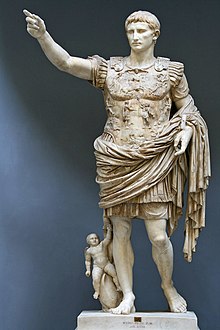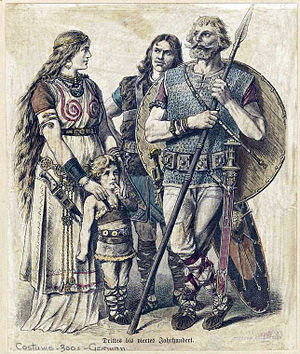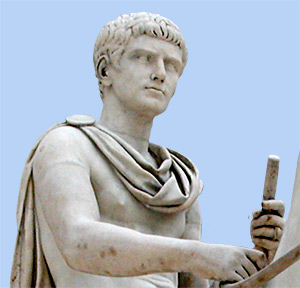Excerpt from The History of the Roman State
Chapter V – Rebirth and Interauctoritas (Augustus’ Empire)

The period following the defeat of Mark Antony and Cleopatra at the Battle of Actium, culminating in their suicides in Egypt, has typically been referred to by historians as the Interauctoritas (latin, inter – “between” auctoritas – “authority”). The reforms instituted by Octavian would transform the nature of the Roman Republic fundamentally, and would come to be referred to more broadly as the Roman Principate.
Octavian returned to Rome from his victory in Egypt in 29 BC and promptly celebrated a triumph. The Senate voted him a triumphal arch inscribed re publica conservata (‘The Republic Saved’) and confirmed his election as Consul once again (from 31 to 27 BC). More than that though, the Senate awarded to him the official title Imperator. Octavian was the most powerful man in Rome, with no military or political rivals whatsoever.
However, for the ambitious Octavian this was not enough and in 27 BC Octavian resigned his positions of power and offered his resignation to the Senate. In what was clearly designed to be a political move, the Senate begged for him to stay and he agreed to retain control of Spain, Gaul and Syria (he already controlled Egypt as a personal territory independent of Rome). This was no accident but carefully crafted, for the bulk of the Roman legions were stationed in these regions. He also kept control of Rome’s foreign policy by assuming the right to declare war and negotiate peace or other foreign treaties. It was at this time that he assumed the name “Augustus”, a political masterstroke with quasi-religious overtones (augustus – “majestic/august/honourable”). He described his ascendancy thus:
Octavian (henceforth referred to as Augustus) was a consummate politician and statesmen. He was careful to maintain Republican protocol, even though in reality his power was absolute and autocratic. His preferred title (in addition to all his other titles), was that of Princeps (‘first citizen/first among equals’). This allowed him to present a clear title with, it was hoped, reasonable Republican precedents.
Although it may have won over the masses and perhaps even the Senate, not all were wholly convinced. Tacitus considered him as a power-crazed hypocrite, concealing his autocratic behaviour under a façade of republicanism. Even the future Emperor Nero Claudius Drusus, and Augustus’ own stepson, was known to have authored a letter criticising his leadership.
Nonetheless the pretence of republicanism is an important distinction. It provided a sense of legitimacy to his rule, maintained clear and concise links with the Roman Republic, and paved the way for future republican reforms that his successors would champion. Although the reign of Augustus may have been a Monarchy in all but name, no future Emperor would ever wield as much power at his height. For that reason historians generally refer to the Roman State in this period as the Roman Principate, rather than formally as the Roman Empire. The Republican era had ended, but with it a new beginning had taken its place.
Chapter V – Rebirth and Interauctoritas (Augustus’ Empire)
“There is no boon that men can desire of the gods or gods grant to mankind, no conceivable wish or blessing which Octavian did not bestow on the Republic, the Roman people, and the world.” – Marcus Velleius Paterculus

The period following the defeat of Mark Antony and Cleopatra at the Battle of Actium, culminating in their suicides in Egypt, has typically been referred to by historians as the Interauctoritas (latin, inter – “between” auctoritas – “authority”). The reforms instituted by Octavian would transform the nature of the Roman Republic fundamentally, and would come to be referred to more broadly as the Roman Principate.
Octavian returned to Rome from his victory in Egypt in 29 BC and promptly celebrated a triumph. The Senate voted him a triumphal arch inscribed re publica conservata (‘The Republic Saved’) and confirmed his election as Consul once again (from 31 to 27 BC). More than that though, the Senate awarded to him the official title Imperator. Octavian was the most powerful man in Rome, with no military or political rivals whatsoever.
However, for the ambitious Octavian this was not enough and in 27 BC Octavian resigned his positions of power and offered his resignation to the Senate. In what was clearly designed to be a political move, the Senate begged for him to stay and he agreed to retain control of Spain, Gaul and Syria (he already controlled Egypt as a personal territory independent of Rome). This was no accident but carefully crafted, for the bulk of the Roman legions were stationed in these regions. He also kept control of Rome’s foreign policy by assuming the right to declare war and negotiate peace or other foreign treaties. It was at this time that he assumed the name “Augustus”, a political masterstroke with quasi-religious overtones (augustus – “majestic/august/honourable”). He described his ascendancy thus:
“Henceforth, I exceeded all men in authority (auctoritas), but I had no greater power than those who were my colleagues in any given magistracy.” – Augustus, Res Gestae (34)
Octavian (henceforth referred to as Augustus) was a consummate politician and statesmen. He was careful to maintain Republican protocol, even though in reality his power was absolute and autocratic. His preferred title (in addition to all his other titles), was that of Princeps (‘first citizen/first among equals’). This allowed him to present a clear title with, it was hoped, reasonable Republican precedents.
Although it may have won over the masses and perhaps even the Senate, not all were wholly convinced. Tacitus considered him as a power-crazed hypocrite, concealing his autocratic behaviour under a façade of republicanism. Even the future Emperor Nero Claudius Drusus, and Augustus’ own stepson, was known to have authored a letter criticising his leadership.
Nonetheless the pretence of republicanism is an important distinction. It provided a sense of legitimacy to his rule, maintained clear and concise links with the Roman Republic, and paved the way for future republican reforms that his successors would champion. Although the reign of Augustus may have been a Monarchy in all but name, no future Emperor would ever wield as much power at his height. For that reason historians generally refer to the Roman State in this period as the Roman Principate, rather than formally as the Roman Empire. The Republican era had ended, but with it a new beginning had taken its place.
Last edited:




